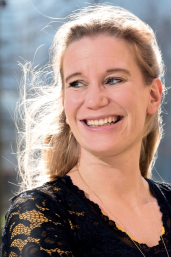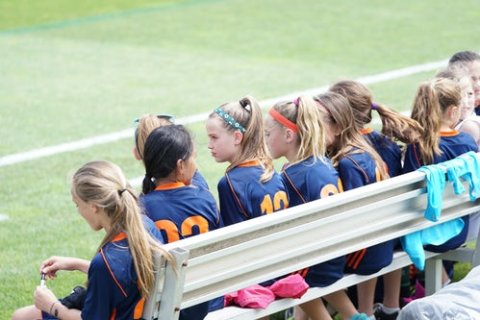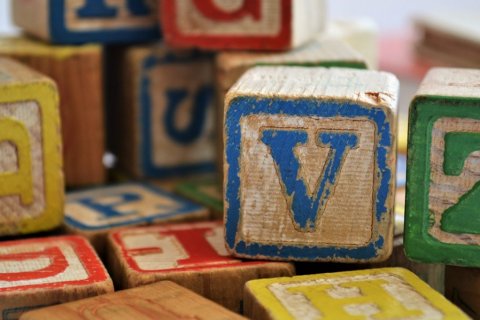Paediatrician Sanne Nijhof: "Joining is what children with chronic fatigue syndrome want the most."
Meet our team of 'Healthy play, better coping'
Sanne Nijhof is a paediatrician specialising in social paediatrics at the Wilhelmina Children’s Hospital. She obtained her doctorate for Chronic Fatigue Syndrome in Adolescents – treatment, features and epidemiology (2013). Part of her doctoral track consisted of developing FitNet, an online platform for cognitive behavioural therapy aimed at adolescents aged 12 to 18 who have chronic fatigue syndrome. Sanne herself has three children, the youngest still an infant.

Because the life expectancy of children with a chronic illness has increased greatly in recent decades, there is now a growing group of young adults who are ageing with chronic conditions and the consequences of those conditions. Sanne: "That means that we doctors have to keep more aspects in mind in the consulting room: the broader context is every bit as important as the disorder itself. You might think of it as practising 'lifelong medicine'. It’s a vision and a topic that doctors like myself must also learn to integrate as a standard part of our talks with patients and their families."
Her patients often have a limited amount of energy that they must allocate wisely each and every day. "That means they must often weigh decisions in a way that most of their peers have never had to. One girl, for instance, said: “When we have a free period, my friends ask if I want to go into town with them. But if I do, I won’t have enough energy to finish the school day. So I choose not to go with them. And now they’ve stopped inviting me; they think I’m boring.'

We see it time and time again in our surveys with questionnaires and interviews: I want to participate, I want to be normal, I want to fit in. Something children with a disability often say they miss is being a member of a sports team or club. Sometimes they say: I’d rather take part in a different way than not take part at all. Give me a role that lets me participate, in whatever fashion, like being a referee or assistant. More than anything, what they want is to keep up with their peers."
Encouraging the everyday
Sanne’s specialisation, social paediatrics, involves the treating physician being aware of the patient’s social context and incorporating it into their treatment. This includes school, family, friends and age peers, possibilities for the future... "And play. Play is an important part of anyone’s development. Play is a simple, everyday thing, and encouraging the everyday is a positive way to approach the problems faced by chronically ill children. So that appeals to me, and the contact with people from veterinary medicine, social sciences and the gamification world is fascinating, too!"
Play is a simple, everyday thing, and encouraging the everyday is a positive way to approach the problems faced by chronically ill children.
The link to veterinary medicine was a real eye-opener: "That type of fundamental research was pretty far removed from my own experience, and I was really surprised by the knowledge they’ve attained so far! And there’s so much overlap with children. The results of the experimental set-ups involving animals – which are obviously not an option with children – are really going to advance our efforts."
Oddly enough, she found the same ‘shock of the new’ in the social sciences. "I hadn’t collaborated with them before, which I realise sounds fairly odd for someone who specialises in social paediatrics. I think it’s because we physicians are so focused on clinical results, on taking decisions, while social scientists think in broader terms: they’re more concerned with establishing links outside the clinical context. They consider every single aspect and elaborate multiple hypotheses – if you ask me, that multifaceted approach can be really valuable for us. What’s more, social scientists deal with vulnerable groups; they’re used to conducting theoretical research in both small and large groups."

You say conditions, I say condition
Another surprise: every field has its own conventions for presenting and writing. "For instance, when I talk about a 'condition', I’m referring to a child’s illness. When Heidi Lesscher says 'conditions', on the other hand, she means the parameters of an experiment involving rats." As a result, co-writing a position paper involved a bit of cheerful confusion. Sanne is satisfied with the result: "Everyone made an equitable contribution. It was a valuable process, in which we started from a solid foundation and arrived at truly innovative ideas."
What does it mean when a healthy child plays less or 'differently' than their peers, and what does it mean for a chronically ill child?
Sanne Nijhof meets with Sander Bakkes and Heidi Lesscher every other week. "And I have a 'buddy', my colleague Kors van der Ent – just like Heidi is paired with Louk Vanderschuren, and Sander with Remco Veltkamp – so that’s more or less the inner circle. We also work with PhD candidates who are tasked with thoroughly exploring our ideas. Like the question: what is play, anyway? What does it mean when a healthy child plays less or 'differently' than their peers, and what does it mean for a chronically ill child? Exploring those differences is a necessary step in order to develop appropriate games. There’s not a lot of right or wrong where games are concerned, whether you play with Lego or just use your imagination. For chronically ill children, however, the social aspect of play comes under added strain." The entire group gets together at least four times a year. Last time they did, IJsfontein, a commercial party that produces intelligent games, was in attendance as well. Sanne: "We bounce our more-developed ideas off them, to see if and when they want to join us for a 'design sprint' aimed at creating prototypes for new games."

Serious games
The development of a serious game is a good fit for the current direction of the Wilhelmina Children’s Hospital, which is investing strongly in healthcare innovations that rely on eHealth. PROfeel, an existing eHealth app, is one example of this. PROfeel is aimed at improving the lives of children in vulnerable positions by offering them support through innovative mobile communication. Several times a day, the children enter the symptoms they are experiencing and what they are doing at that precise moment. This provides them, and their healthcare providers, with insight into the progression of their symptoms throughout the course of the day and any aspects that might be connected. It’s then possible to deploy treatment based on this data.
The app helps these children learn to take control in managing their own fatigue symptoms.
Sisters building forts
For her own family, in the city, playing outside is quite different than what she remembers from her own childhood. "Now, I’m organising and facilitating play: escorting them across busy streets, coordinating with other parents, planning." Sanne grew up in Goeree Overflakkee, which was another story entirely. "A large garden, building forts, my sisters and I being outdoors around the clock, tons of imagination play – and you could always drop in on someone in the village for a visit."
Research theme Dynamics of Youth
If you want to tackle social problems, it would be best to start with children. The Utrecht-based research theme Dynamics of Youth invests in a resilient youth. Academics from all fields collaborate in order to learn to better understand child development. How can we help children and youngsters to grow and flourish in our rapidly changing society?

